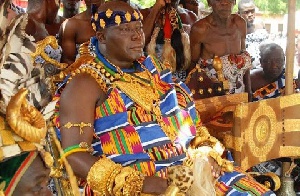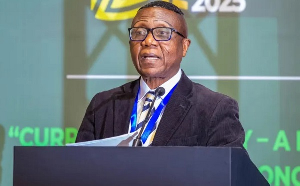In the beginning, God created the heavens and the earth, according to the good old book, The Bible, and employed man to have dominion over everything “And God blessed them. And God said to them, “Be fruitful and multiply and fill the earth and subdue it and have dominion over the fish of the sea and over the birds of the heavens and over every living thing that moves on the earth.” Genesis 1:28
God the Father who created and owns the whole of the universe including the His children has the whole of the universe and His Kingdom as an inheritance for us to keep. From the beginning of live, he apportioned sections for selected people to rule.
He created domains all-over for people to dwell and each of these domains ought to have leaders call kings. In the beginning of time, He was the immortal King of His people but at a point, He yielded to the persistent request of man to have a mortal king.
Kingdom is formed of two English words, ‘King and Domain’. In fact, every king has where the rules, a territory if you like. The territory is what is referred to as a domain. So it becomes king and domain – kingdom. The king’s domain is his kingdom.
The entire world and Ghanaians, in particular, are celebrating the king of the Asante domain – the Asante kingdom. On April 26, 1999, when I was the first Ashanti Regional Correspondent for Ghana’s first free-on-air television, TV3 Network Limited, the then Barima Kwaku Duah, who at the time was 49 years old, was enstooled at a colourful and extremely rich cultural event as the 16th king of the Asante kingdom.
He was traditionally named after one of the powerful and wise kings of the kingdom, Osei Tutu 1 who is believed to have founded the modem Asante kingdom. Hence his stool name Otumfuo Osei Tutu II. He is 20 years on the Golden Stool, this month of April.
The Golden Stool known otherwise as the “Sika Dwa Kofi” in the local dialect is the royal and God-given throne of the good people of the Asante. It is also deemed as the very definitive symbol of power and unity among this powerful people.
It is also widely believed that this stool descended from the sky and landed on the lap of the first Asante king, Otumfour Osei Tutu 1. Above all, it was and still the symbol of extraordinarily traditional leadership emblem for the Asante Kingdom of this country. That was said to be the beginning of a powerful kingdom warring to conquer several territories and the continuation now with the second Osei Tutu is to fight wars against commotion, poverty, illiteracy, injustice and underdevelopment.
Few months into his enstoolement I had the prevelage of meeting him one-on-one, at his private residence, courtesy, the then Chief Executive of Kumasi Asante Kotoko Football Club, Mr Herbert Mensah. The informal chat we had and the words of wisdom I heard were a clear indication of a very good and positive omen for the good people of his kingdom and Ghana in general.
Within weeks he laid out plans to bring a dramatic change within what he had inherited. His popular saying, “in the olden days, kings led their people for war but today, we have to lead the people for development” became so much popular and well acclaimed. The response from the people including those outside his kingdom was the showering on him the accolade “King Solomon”
Sooner than later, the entire nation witnessed the establishment of famous Otumfuo Educational Fund to provide assistance and support, to brilliant but needy school pupils and students. Today over 20 thousand students at all levels of education from around the country have benefitted from this enviable package, which has helped in changing the lives of many people in Ghana especially in the rural Ghana.
New school buildings have been built while a number of old and dilapidated ones have ben rehabilitated. Some schools in Ghana have received huge learning and teaching aids under the fund with teachers being encouraged and motivated through the provision of basic needs and teacher award scheme.
As the Chancellor of the Kumasi based university, The Kwame Nkrumah University of Science and Technology, for the past 13 years, he has helped in developing infrastructure and facilities as well as human resources for the enhancement of teaching, learning and training,
For him “it was an opportunity to serve, and indeed, have nurtured, molded the KNUST to be one of the best science and technology learning institutions in Ghana and a world class one.”
In the health sector Otumfuo Osei Tutu 11 has instituted the a Health Fund to pursue a basic health care plan to finance the reduction of maternal and infant mortality, glaucoma and other eye diseases.
The Serwaa Ampem AIDs Foundation for children under the leadership of his wife, Lady Julia Osei Tutu to help children who have become victims of the HIV/AIDs pandemic is also commendable.
Residential quarters for nurses and other paramedical staff have been provided and general health campaign in co-operation with the state agencies has been stepped up in the rural areas.
Otumfour Osei Tutu 11 has blended wisdom, education, knowledge and tradition to reshape the focus of chieftaincy not only in Ghana but also around the globe. For the fist time in the history of Ghana, the king of the Asante kingdom, led a eminent chiefs from Ghana to parade the rich culture of the nation and the Ashanti’s in particular and also engaged business groups in London in the United Kingdom and Atlanta in the United States in the year 2003 at the first ever trade and investment fair on Ghana outside Ghana in these two powerful as well as business and economic hubs.
Many traditional and political leaders have engaged him to tap his tactics and strategy of the effective and forward-looking leadership.
His lecture at the at Boston’s Museum of Fine Arts (MFA) as the guest of honour at the MFA and Harvard University’s W.E.B. Du Bois Institute for African and African-American Studies, USA, for example, was one that hugely projected the Ghanaian chieftaincy institution and its shift in old concepts as well as exhibiting the incredible African values.
To the whole world the king who has positioned himself emphatically, to “fight for development and peace” delivered and exceptionally brilliant lecture on “Chieftaincy and Development in contemporary Africa: The Case of Asante” to the admiration of his audience who very long standing ovation and the extoled applause said it all.
For him. “The need for this international respectability and good image of Africa’s progress today has come about because ever since Africa’s encountered with the colonialists in the 18th century, the continent has suffered painful bad image abroad and has been described in all sorts despicable ways – “primitive,” “basket case,” among others – by people who did not know and understand Africa and this situation has not helped in her progress.” Hence his commitment to lead the campaign with his position to bring about new thinking about Africa.
This was not the only platforms he had used to explore means of getting befitting place in the global scene for Africa and Ghana, for that matter, at the Chatham House in London among many other places he has made his intentions and desires well known. That is to ensure peace, unity and development for the good of his country and continent.
Opinions of Wednesday, 1 May 2019
Columnist: Nana Sifa Twum
Hail the King, Otumfuo Osei Tutu II (Part 1)
Entertainment














